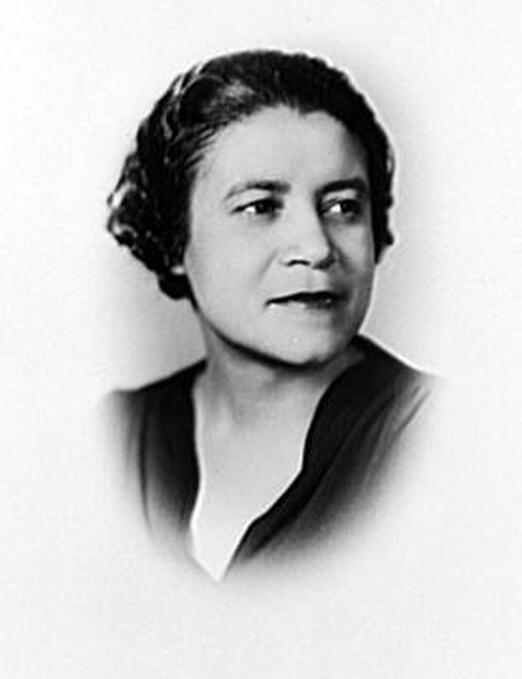FIRST AFRICAN AMERICAN WOMAN TO SERVE IN A STATE LEGISLATURECrystal Dreda Bird was born June 27, 1894, in Princess Anne, Maryland, the
youngest of nine siblings to Benjamin Oliver Bird, the first principal of Princess Anne Academy (now the University of Maryland Eastern Shore), and Portia E. Lovett Bird. Upon the death of Benjamin Bird in April of 1897, Portia took over the Academy’s leadership until her own death two years later in March of 1899. Just over five years old when her mother died, Crystal was reared in Boston by her maternal aunt, Lucy Groves and was educated in the integrated public schools of Boston. In 1914, Crystal received a degree from Boston Normal School, and taught in the public schools for three years. In 1918, she began work as a supervisor with the Young Women’s Christian Association (YMCA) and traveled the United States of America, Cuba and Mexico as the YMCA’s representative on services for blacks. She was also associated with the American Friends Service Committee (AFSC), a service organization affiliated with the Quakers. After the relief effort in Europe ended in 1924, it was decided that better interracial relations needed to be addressed in the United States. In 1925, an Interracial Section was formed in the AFSC and Crystal Bird was offered a staff position, and she began work with the group in 1927. Her goal with the organi- zation was to “have people of other racial groups understand the humanness of the Negro wherever he is found,” and to literally “lift the curtain of misunder- standing that is so dividing us.” From September of 1927 to September of 1928, she made 210 appearances before over more than 40,000 people (mostly whites) for the AFSC. Her emphasis was to present the contributions of African Ameri- cans to American life, which often included an analysis of prejudice because she realized that many white Americans did not understand nor think of African Americans as humans. In 1931, Crystal Bird graduated from Teachers College Columbia University with a Bachelor of Science degree and worked as a social worker and administrator of Negro Affairs for the YMCA in New York City and Philadelphia. While a student at Columbia University, Crystal was an accomplished singer and pianist, but she was also a social activist. She repeatedly gave a lecture entitled “Music in the Life of America.” In 1931, she married Arthur Huff Fauset (1899-1983), a soci- ologist, anthropologist, and political activist, a University of Pennsylvania alumnus, and Principal of Philadelphia’s Singerly Public School. He was from a well-established family and was the fourth known African American to have received the doctorate in anthropology. Sadly, the marriage did not last over a year and he divorced her in 1944. In 1932, Crystal Bird Fauset established the Colored Women’s Activities Club for the Democratic National Committee where she helped African American women register to vote. The next year, she helped to establish and was named executive secretary for the Institute of Race Relations at Swarthmore College, where she documented incidents of job and housing discrimination in Pennsylvan- ia. In 1935, she became director of the Negro Women’s activities for the Demo- cratic National Committee, and in 1936 was appointed assistant personnel di- rector in the Philadelphia Office of the Works Progress Administration (WPA). Crystal Bird Fauset was such a prominent and prolific figure in Philadelphia’s politics and was so active in getting people to vote, especially women, that in 1938, she was asked by Philadelphia’s local Democratic Party to run for a seat in the Pennsylvania House of Representatives. She was elected on November 8, 1938 to the Assembly of the Commonwealth of Pennsylvania, as the first African American woman ever elected to a state legislature. She won in a district where two-thirds of the voters were White. In office, her focus was on slum clearance, low-cost housing projects, public health, public relief, protection for women in the workplace, and fair employment legislation which banned discrimination against minorities. In 1939, Pennsylvania’s Governor George Earle recognized Crystal Bird Fauset’s efforts by giving her the Meritorious Service Medal. She kept her po- siton in the legislature for only one year because she accepted an appointment in November of 1939 to the Pennsylvania WPA as assistant director in charge of education and recreational programs. She resigned her post in the Pennsylvania State Legislature because she believed she was more effective helping people by promoting equal justice and understanding between the races in her position with the WPA. She was criticized for her decision to resign the positon, but it did not deter her from her goal of helping others. However, in 1941, with the assistance of her very close friend, First Lady Eleanor Roosevelt, and New York City Mayor Fiorello LaGuardia, Crystal Bird Fauset was appointed the special racial consultant on Negro Affairs in the Office of Civilian Defense in Washington, D.C. As a result of those close connections to major, powerful political figures, Crystal Bird Fauset was soon listed as a member of President Roosevelt’s “Black Cabinet,” that promoted civil rights and fair en- listment for Black Americans. Crystal Bird Fauset also helped to recruit Black Americans for the military and the war effort. During World War II, she disagreed with the formation of segregated Black units within the military and its policy of racial discrimination. By 1944, she had become disappointed with the Democratic Party and its mishandling of Black Americans during the war. She did not care for its manner of excluding blacks from combat missions, their assignment to menial jobs, their exclusion from USO canteens, and other blatant discriminatory practices. After having expressed her concerns with the Democratic Party and nothing seemed to have been done to rectify those issues, Crystal Bird Fauset switched her political affiliation to the Republican Party in 1944. She supported the Republican Party’s candidate, Thomas E. Dewey, as she had the previous Democratic candidate, and eventually became an advisor on Negro Affairs to the Republican National Committee. Switching political parties did not further her political career, and it ended her appointments to major national and local committees. Nonetheless, it did not end her commitment or involvement in civic affairs and community activism. Crystal Bird Fauset remained active in state and local politics. Other posit- ions she held included the following:
For her work encouraging people to vote and participating in the political process, her efforts to achieve international friendship and her leadership in the American-Korean Foundation, Crystal Bird Fauset received her second Merito- rious Service Medal from the Commonwealth of Pennsylvania. It was presented to her by Governor John S. Fine in 1955. Crystal Bird Fauset did not retire from the political scene but continued to help initiate political, social and economic change until she had a heart attack and died in Philadelphia, Pennsylvania on March 27/28, 1965. Due to her commit- ment to public service, a Pennsylvania Historical and Museum Commission Mar- ker is located outside of her former home at 5402 Vine Street in Philadelphia. Crystal Dreda Bird Fauset was born and spent her early years on the campus of Princess Anne Academy (UMES), in Princess Anne Maryland, until she was orphaned. She had the determination to succeed in spite of the odds against her. She studied, learned, worked hard and became the first African American woman to serve in a state legislature. She was a trailblazer, as she paved the way for women to engage in politics and public service locally, nationally and interna- tionally.
0 Comments
|
Archives
July 2024
Categories |


 RSS Feed
RSS Feed
